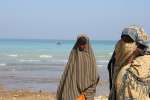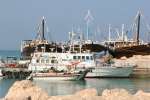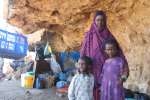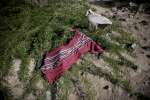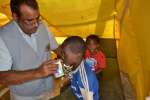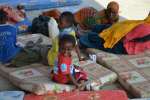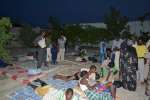- Text size
 |
|  |
|  |
| 
- Français
UNHCR cautiously optimistic over Yemen ceasfire
Briefing Notes, 16 February 2010
This is a summary of what was said by UNHCR spokesperson Melissa Fleming – to whom quoted text may be attributed – at the press briefing, on 16 February 2010, at the Palais des Nations in Geneva.
UNHCR is encouraged by the first and so far lasting ceasefire between Yemeni troops and the Al Houti movement in northern Yemen since August 2009, when the six year old conflict reignited. The ceasefire came into effect late last Thursday (11 February) and the first phase of implementation has begun. Several earlier such attempts quickly collapsed. More than seven months of fierce fighting in Sa'ada province has doubled Yemen's displaced population, pushing the number of internally displaced people (IDPs) to 250,000.
As part of the UN team in Yemen, UNHCR is renewing its call for access to Sa'ada province, enabling aid agencies to deliver much needed help to the civilian population. Coordination meetings have started in that regard.
Displaced people and those who were trapped by fighting need urgent and massive support. Despite ongoing aid efforts, the IDPs who cater for themselves or stay with the host communities are fast exhausting their remaining resources. People who fled from Sa'ada tell us that many are being forced to sell cherished personal belongings to secure basic needs.
Meanwhile, three IDP camps at Al-Mazrak in Hajjah province continue to grow and now host more than 27,000 people. We continue to admit new IDPs to Al-Mazrak 3 camp, which is is also receiving transfers from the overcrowded Al-Mazrak 1 site. As the camps offer safe shelter and basic services many IDPs continue to wait in makeshift sites along the road to be registered and allocated tents in one of the camps.
UNHCR in Yemen is preparing for a potential shift in its operations as many IDPs, following the news about the ceasefire, say they want to go back to their homes in the north of the country. As part of the overall UN response, we are working on plans for voluntary and safe return of IDPs which will be discussed with the authorities in the coming days providing security is sustained. As the first step in bringing these plans to life, we are hoping that a joint Government-UN mission will be able to visit Sa'ada province as soon as possible. The mission would assess the situation and immediate humanitarian needs.
We are especially concerned about the safety of those IDPs who may decide to return on their own as parts of Sa'ada province where fighting took place remain littered with mines and unexploded ordnance. These pose a serious risk and UNHCR urges caution to avoid any further and unnecessary loss of civilian lives. Removal of mines and unexploded ammunition is a priority before any massive return can take place. UNHCR is ready to assist in the return process.
However, we continue to face a serious funding shortfall in Yemen and may be forced to scale down or suspend our operations for refugees and IDPs in this country if we do not receive fresh contributions urgently.
UNHCR's part of the 2010 UN consolidated appeal for Yemen amounts to US$ 39 million. To date, we have received less than three per cent of the needed funds. This is an alarmingly weak donor response. Displaced Yemenis and refugees in Yemen are in urgent need of international assistance and we especially hope that the countries in the region will act in their usual spirit of solidarity.

